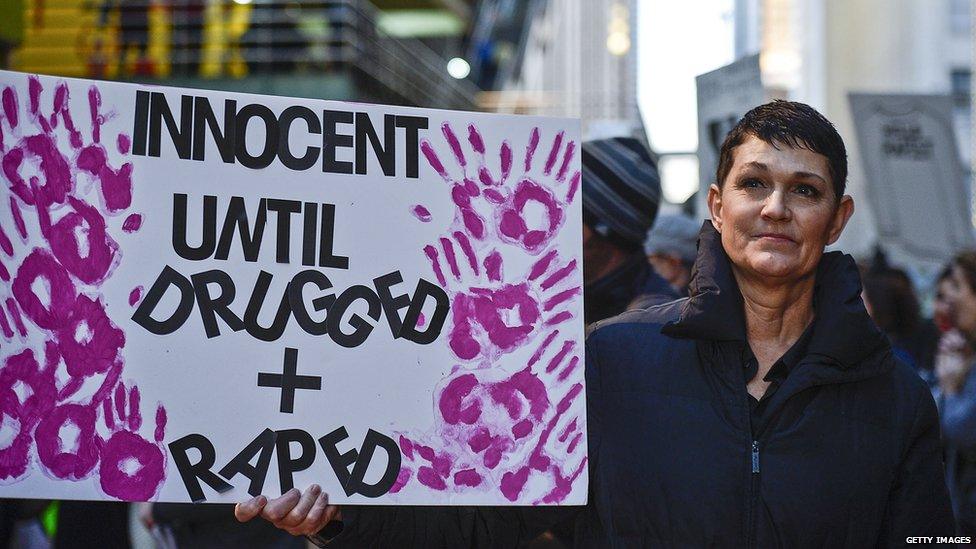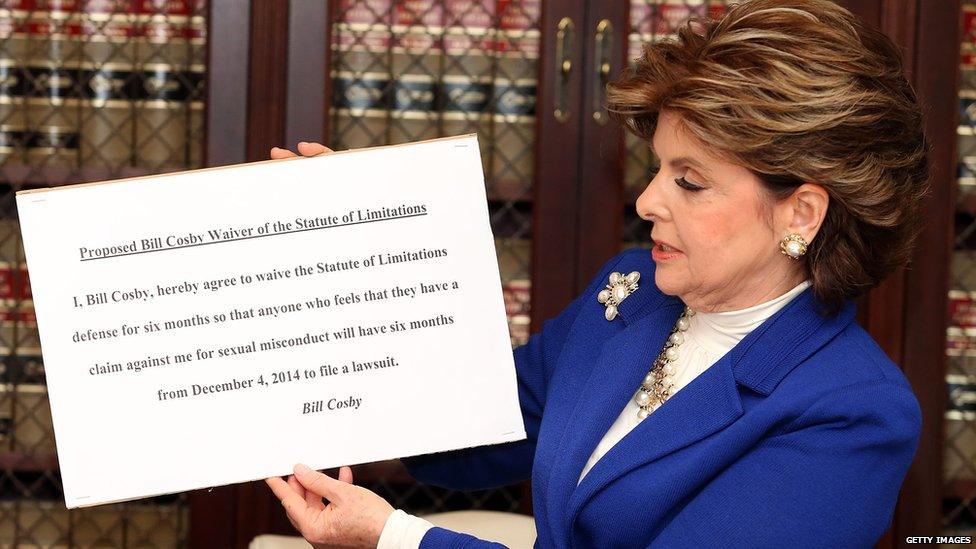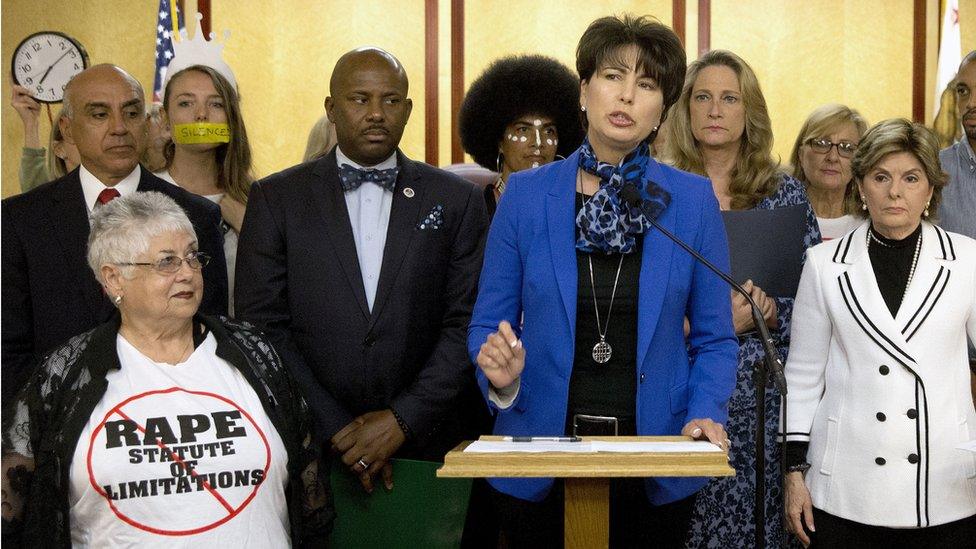Bill Cosby: Why is there a time limit on bringing sexual assault cases to US courts?
- Published

Beth Ferrier, who alleges she was assaulted by Bill Cosby, successfully campaigned to change sexual assault laws in Colorado
More than 50 women allege they have been sexually assaulted by the comedian Bill Cosby, but only one woman will face him in criminal court. Campaigners say laws which set deadlines on when these crimes can be reported, deny survivors justice.
It started when he was just eight. A man, well known to his family, began grooming him.
Fifty years later, Kevin Sweeney is finally able to talk about the sexual abuse to which he was subjected.
"It quickly escalated to inappropriate touching, and eventually rape," explains Mr Sweeney.
It continued until Mr Sweeney was 13 years old. His abuser threatened to harm his siblings and parents if he told anyone, so he stayed silent.
Now a school teacher, married with children, Mr Sweeney lived with his secret for decades.
In his early forties, after learning his abuser had died, he worked up the courage to tell his wife.
"It took about 8 months of therapy before I could say the word rape," he explains.

Kevin Sweeney campaigned to change sexual assault laws in Ohio
By then, it was too late to seek justice - even if his attacker had been alive, he could not have pressed charges, thanks to the statute of limitations on such crimes in his home state.
Statutes of limitation set deadlines on when someone can file a criminal complaint.
In murder cases there is no time frame, but for many other crimes, the clock starts ticking after an alleged offence occurs. When it comes to allegations of rape and sexual assault, states have different laws. The window of opportunity can vary from a few years, to a few decades. In sixteen states there is no limit.
Campaigners say this law has impeded many of those who are accusing Bill Cosby from seeking justice. Proponents say it's necessary to keep the justice system fair.
Fifty-eight women have come forward claiming Mr Cosby sexually assaulted them - allegations spanning from the 1960s to the late 2000s.

Bill Cosby is due to face trial in June 2017
But only one of these women has brought charges against Mr Cosby.
"For most of these accusations, it was simply too late for a prosecutor to even consider them," Gloria Allred, the lawyer representing more than 30 of the women, recently wrote.
Mr Cosby is due to go on trial in June next year, accused by Andrea Constand of drugging and abusing her in Pennsylvania in January 2004. He denies the allegations and all the others.
Ms Constand first went to the police in 2005, but prosecutors initially said there wasn't enough evidence to press charges.
Last year the case was reopened, after new evidence emerged. Ms Constand filed her case a few days before the statute of limitations - which is 14 years in Pennsylvania - was about to expire.
But other women who accuse Mr Cosby of sexual assault say they feel cheated.
Lise-Lotte Lubin says she passed out after Mr Cosby gave her two alcoholic drinks and petted her hair at a hotel in Nevada in 1989. She believes she was drugged by the comedian.

Lise-Lotte Lubin alleges she was assaulted by Cosby in 1989
She tried to file a police complaint at the start of 2015, after other women came forward with stories very similar to her own. Because the four year statute of limitations in Nevada had passed, it was too late.
Testifying before a judiciary committee in March of that year, she said, "I now understand that the law prevents the victim in my circumstances from seeking justice."
In May 2015, a new law was passed giving survivors up to 20 years to report an alleged sexual crime. Ms Lubin, who was one of the leaders of the campaign for change, said the new law would provide survivors of sexual assault "much needed time" to come forward.
In June this year, Beth Ferrier and Heidi Thomas, who both allege Mr Cosby assaulted them in the 1980s, celebrated as politicians in Colorado doubled the statute of limitations there from 10 to 20 years.
Mr Sweeney also successfully fought to change the statute of limitations in his current home state, Ohio.
In June 2015, the state increased the time sexual assault survivors have to file a complaint, from 20 to 25 years. He hopes the limitation will be removed completely one day.
"Imagine that your wife or your daughter or your sister or mother had had this experience, and that you did everything you could as their parent or spouse to get them to a point where they were strong enough to testify but then found out you couldn't because time was up.
"What would you say to them then?"

The cover of New York magazine featured 35 of the women who have came forward with accusations against Bill Cosby
The fight to change statute of limitation laws across the US has been met with resistance. The Catholic Church has lobbied against proposals to change child sexual assault laws in several states.
Many legal experts argue these laws exist to protect defendants.
Joe Patrice, a former lawyer who edits the legal news publication Above the Law, believes there needs to be a cut-off point so a defendant isn't at the mercy of prosecution indefinitely.

Lawyer Gloria Alldred represents some of Mr Cosby's alleged victims, and has fought to change the law
Keeping a case within a set period avoids a scenario where memories fade and it becomes one person's word against another's, he argues. Mr Patrice is also concerned that in sexual assault cases where DNA is crucial, evidence could get corrupted over time.
But it can take decades for DNA evidence to come back in the first place. In a number of states, including Ohio, rape kits lie untested for decades.
Amy Roberts had to wait nine years for her rape kit to come back.
Two decades ago, a man broke into her college apartment and raped her at knifepoint.
"I thought he was going to kill me," she said. "After I left, I went to the hospital and got a rape kit done, and I reported it to the police and basically that's where it stayed for a while."

Child sexual abuse survivors have been campaigning for change, for decades
Ms Roberts' attacker still hasn't been caught. Like Mr Sweeney, she also testified before the state Senate in Ohio.
As part of the new changes introduced, victims now have an additional five years to file a case after DNA is found.
"Rape is such a traumatic crime. It's almost 20 years and I still feel like it's affected my core.
"The idea that there's an arbitrary timeline that a person can no longer be held accountable makes no sense."
The publicity the Cosby case has thrown onto these issues could bring about even more change.
In California, a state where some of Mr Cosby's accusers live, a bill called SB 813 was recently passed to end the statute of limitations for rape, child sex abuse, and other sex crimes.
Governor Jerry Brown has until the end of September to sign the bill into law.

Connie Leyva (in blue) helped spearhead a law to end the statute of limitations for rape in California. It's now up to the Governor to decide whether to sign it.
The author of the bill, State Senator Connie Leyva, says the high burden of proof still stands in these cases.
"SB 813 simply ensures that the door does not slam in the face of victims," she says.
And for Mr Sweeney, it's important that door always stays open.
"One of the dangers of statutes of limitations is that it's assuming a victim's healing process is linear and logical. But it's not.
"It's more like a wave pattern. I feel strong today, but tomorrow I don't."
Follow Rajini on Twitter - @BBCRajiniv, external